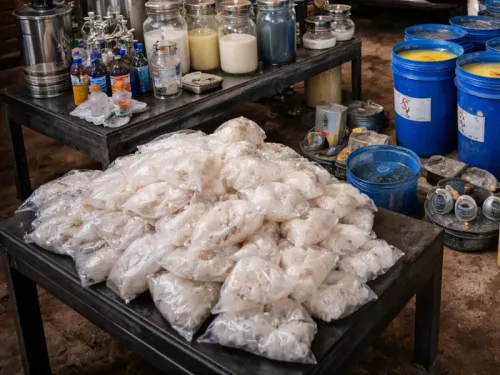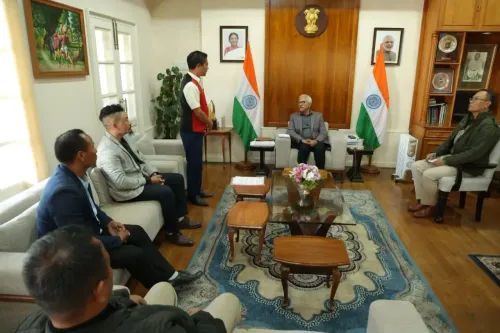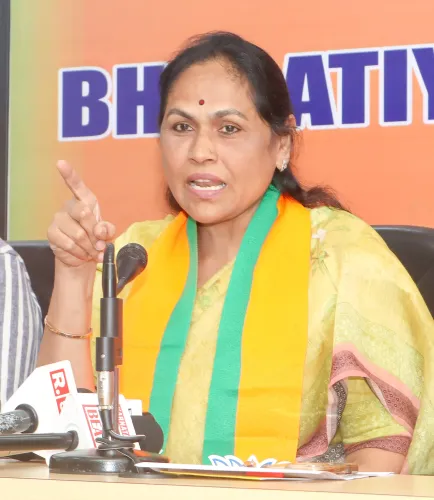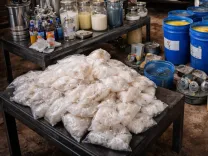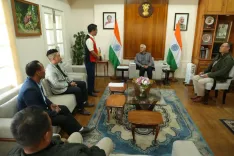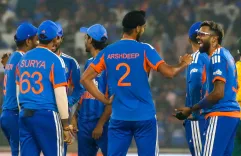Delhi Elections: A Saga of Twists and Controversies Before Poll Day
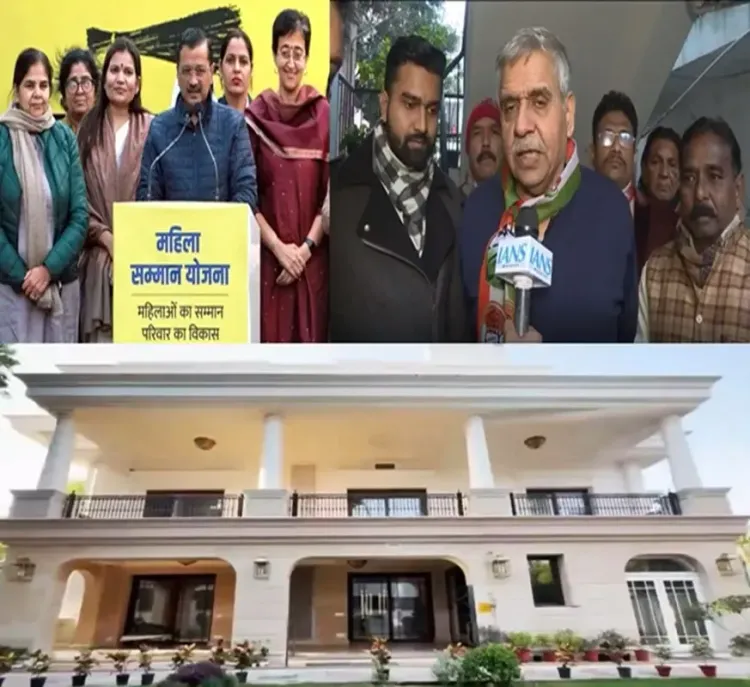
New Delhi, Jan 12 (NationPress) The distinctive campaign methods, political upheavals, and controversies leading up to the February 5 Delhi Assembly elections have undoubtedly made this fiercely contested election an unforgettable event.
The incumbent AAP and the opposition parties BJP and Congress are striving to generate excitement, announcing appealing promises while attacking their adversaries and questioning the integrity of the voter list revisions.
As the campaign for the February 5 election approaches its final stages, it is essential to examine the issues that the three parties are emphasizing to attract voters. Key topics include corruption, pollution, voter name deletions, free power, water, various financial and health schemes, job opportunities for bus marshals and youth, development in unauthorized colonies, and permanent housing for slum residents.
Sheesh Mahal
The title for the most talked-about term in the 2025 Assembly elections goes to “Sheesh Mahal.” This phrase was introduced by the BJP to refer to the renovated residence of former Chief Minister Arvind Kejriwal and the associated corruption allegations.
As “Sheesh Mahal” gained traction in the city’s political discussions, the BJP cited CAG findings that indicated the renovation expenses of the CM’s residence escalated from Rs 8 crore to Rs 32 crore due to alleged corruption.
BJP’s Parvesh Verma, contesting against Arvind Kejriwal in New Delhi, stirred controversy by distributing Rs 1,100 cash to women as financial assistance through his NGO—an initiative that appealed to female voters but led the AAP to label it as “Cash for vote.”
The specter of the liquor scam resurfaced to trouble Kejriwal and his AAP government just before the elections, as CAG findings revealed a loss of Rs 2,026 crore to the state treasury, putting the AAP on the defensive.
Despite the AAP maintaining its denial, the excerpts from the CAG report raised questions about the party’s anti-corruption claims. The AAP emphasized its clean image by publicizing crowd-funding for campaign expenses by leaders like Manish Sisodia and Atishi, while the BJP and Congress showcased the jail terms served by Kejriwal and his ministers in money laundering cases.
In an effort to highlight corruption in the Yamuna river cleaning, Delhi BJP President Virendra Sachdeva took a dip in the polluted river, resulting in skin allergies. The BJP claimed an Rs 8,500 crore scam in the river cleaning project.
Electoral Roll Controversy
Even with Chief Election Commissioner Rajiv Kumar asserting that electoral rolls are free from manipulation, the ruling AAP has maintained pressure on the BJP by accusing the opposition of deleting names of AAP voters from the electoral rolls.
The name of AAP MP Sanjay Singh’s wife, Anita, was also removed during the summary revision that eliminates names of absent, shifted, and deceased voters.
Kejriwal further alleged that fake voters were added to the addresses of BJP MPs in the New Delhi constituency. The former chief minister also lodged a complaint with the ECI, asserting that the manipulation of electoral rolls and the distribution of cash by BJP candidate Parvesh Verma could render the election a “farce.”
The Delhi BJP countered by vowing to eliminate Rohingya and Bangladeshi voters, accusing the AAP of adding fictitious voters to lists across the city.
Welfare Scheme War
Kejriwal and CM Atishi announced the Mahila Samman scheme, promising a stipend of Rs 2100 per month to unemployed women, but the Delhi government’s women and child development (WCD) department declared that the “Mahila Samman” scheme was “non-existent.”
Undeterred, Kejriwal introduced the Pujari and Granthi financial assistance scheme offering Rs 18,000 monthly payout. However, this initiative also faced obstacles, as it could not launch in Kejriwal’s New Delhi constituency due to objections from a group of Pujaris from Hanuman Mandir in Connaught Place.
Kejriwal’s Sanjeevani health insurance scheme, which provides free treatment in private hospitals for individuals over 60, appeared to be a competitor to the BJP’s Ayushman Bharat PMJAY available nationwide. Nevertheless, AAP’s effort to register beneficiaries for the Sanjeevani scheme also encountered controversy.
In response to AAP’s freebie promises, the BJP leveraged Prime Minister Narendra Modi’s assurance—continuation of all ongoing welfare schemes of the AAP government. The BJP not only promised free water, power, and bus travel for women but also pledged to enhance family savings and earnings through a rooftop solar power generation scheme.
During a rally in Delhi, PM Modi coined the term “AAP-da” (calamity) for the ruling party, launching the slogan “Ab nahin sahenge, badal ke raheinge.”
PM Modi also distributed house keys to slum residents in Ashok Vihar in north Delhi, signaling that every resident of jhuggi jhopari in the city would receive a permanent house and tap water supply under the BJP government. He also emphasized the free ration scheme and Pradhan Mantri Bhartiya Janaushadhi Pariyojana (PMBJP) affordable generic medicine outlets of the Central government.
While the AAP highlighted its Mohalla Clinic scheme, the BJP and Congress circulated images of defunct facilities.
The Congress continued to showcase achievements during CM Sheila Dikshit’s tenure and matched rival promises by offering Rs 2,500 monthly support for women, Rs 8,500 monthly assistance for unemployed youth, and a Rs 25 lakh health insurance for all citizens.
The ongoing campaign has seen all three parties making significant efforts to appeal to Purvanchalis, who make up about 42 percent of Delhi’s 1.55 crore voters and predominantly reside in unauthorized colonies with inadequate civic amenities.
Demands for reservation in Central government jobs and colleges for Jats, recognized as an OBC in Delhi, also became contentious. The AAP accused the Modi government of neglecting Jats, while the BJP reminded voters of the mistreatment faced by Kejriwal towards Jat leader Kailash Gahlot, who left the AAP to join the BJP.
The termination of civil defense volunteers (CDVs) serving as bus marshals also sparked tension, with the ruling AAP blaming the BJP-controlled Raj Niwas for the CDVs’ struggles.
Musical & Digital Warfare
Both the AAP and BJP launched their campaign songs underscoring Kejriwal’s commitment to Delhiites and the citizens’ promise to effect change, respectively. The contest between the popularity of ‘Phir laayenge Kejriwal’ and ‘Badal ke Rahenge’ is anticipated to persist until the campaign concludes on February 3.
The campaign is also experiencing a poster battle, with an AAP poster targeting the BJP featuring Ramesh Bidhuri, the BJP candidate from Kalkaji, branding the BJP as the “Gaali Galoch Party.”
In response, the BJP intensified its digital campaign by launching a new poster labeling Kejriwal as “Sheesh Mahal wale AAPda-e-Azam.” Sharing it on X, the Delhi BJP stated, “Delhi ki Janta ne thaana hai, Sheesh Mahal wale AAPda-e-Azam ko hatana hai (Delhi's public has vowed to remove Sheesh Mahal's AAPda-e-Azam).”
Priyanka Gandhi in Kalkaji Campaign
Desperate to assert its presence in the Delhi Assembly, Congress workers found a new reason to express their discontent over a recent remark by BJP candidate from Kalkaji Ramesh Bidhuri regarding Priyanka Gandhi.
Bidhuri assured that he would make the constituency’s roads “smooth like Priyanka Gandhi’s cheeks” and later retracted the comment, claiming no offense was intended.
This remark, however, has incensed core Congress voters, not just in Kalkaji but across numerous constituencies, who may turnout in larger numbers than in 2020. “We will teach BJP a lesson for degrading the level of discourse,” remarked a voter at the CGHS dispensary near K-block in Kalkaji.
Bidhuri faces off against Chief Minister Atishi and former MLA Alka Lamba of the Congress. The two-time MP’s personal attack on Atishi regarding her surname also sparked a controversy.
Another significant incident during the campaign that boosted Congress confidence was Sandeep Dikshit, the candidate from New Delhi constituency, lodging a complaint with Lieutenant Governor V.K. Saxena against the AAP for fraudulently collecting sensitive information from women under the guise of a non-existent financial assistance scheme.
Dikshit’s assertive stance against alleged surveillance at his residence by suspected Punjab Police officers also contributed to Congress’ newfound confidence.
Leader of the Opposition in Lok Sabha Rahul Gandhi making cold coffee at an upscale restaurant in Connaught Place and engaging with the youth also attracted attention ahead of his scheduled rally at Seelampur in east Delhi.


